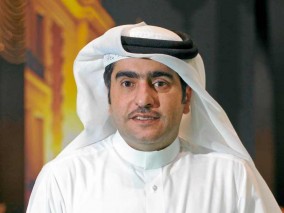

Interview: Katara Hospitality's CEO

Katara Hospitality CEO Hamad Abdulla Al-Mulla has a firm idea about where his Qatar-based company is heading and how it’s going to get there
It is little wonder that Katara Hospitality is enjoying 2014.
With guaranteed headlines across Europe and plenty to talk about in the Middle East, Qatari national CEO Hamad Abdulla Al-Mulla is optimistic about the group’s fortunes.
“We believe our breadth of operations, geographically and across market segments, with our range of investments mean that we are well positioned for another successful year ahead,” he purrs.
“We have important openings in 2014, including the Merweb Plaza Hotel, Doha, The Peninsula Paris and the Excelsio Gallia in Milan.”
The Peninsula Paris will emerge as “one of the most luxurious destinations in Europe” Al-Mulla asserts and Excelsior Hotel Gallia Milan, which first opened in 1932, has undergone a renovation and expansion.
The European adventure continues with The Royal Savoy in Lausanne, which is now well under way and there will also be increased activity on the Bürgenstock resort project, one of Switzerland’s most important tourist resorts.
“The openings in Europe will add further operational strength, building on the foundations of our successful portfolio,” Al-Mulla explains, adding that the company is seeking new investments “as we aim for our goal of 30 properties by 2016”.
Closer to home is the ongoing development on the iconic Katara Towers, Lusail Marina District in Qatar, but this year is very much about the The Merweb Plaza Hotel.
Merweb is the Qatar-born and -grown brand, intimately related to the history of the country, a metamorphosis of Arabic hospitality heritage enhanced through technological innovation.
Article continues on next page ...
“The Merweb Plaza Hotel will comprise 175 rooms and suites equipped with the latest technologies and amenities required by business travellers, while restaurants, meeting and banqueting space and recreation facilities will complement the offer,” Al-Mulla explains.
Talking Talent
When it comes to filling these new hotels with staff, Al-Mulla says there are plenty of ways to secure talent.
“Companies looking to hire talented staff can enlist the services of headhunting organisations in the region, some of which cater specifically to the hospitality sector,” he advises.
“It is helpful to define job responsibilities of the role that needs to be filled, and also to outline the personality characteristics a hotel looks for in potential employees.
Especially in the case of young talent starting out in their careers, hotels must remember to recruit on the basis of personality rather than just experience.”
And when it comes to getting the best recruits, Al-Mulla says candidates are attracted to hotel companies that offer various learning and growth opportunities.
“Training and development is important in today’s competitive environment,” he explains.
“Another key factor is empowering employees and delegating decision-making authority.”
Keeping it relevant
While opportunities abound for the employee, the hospitality industry as a whole is becoming increasingly competitive and one of the greatest challenges for any hotel is to determine how to be more innovative and differentiate from competition.
And with Qatar’s unprecedented growth and plethora of high-profile hospitality projects, there is a real challenge to maintain competitive room rates while stimulating healthy competition to maintain service standards, Al-Mulla says.
“With today’s dynamic economy and in turn, fast evolving hospitality needs, hotel GMs will have to keep their strategies flexible and plan for change,” he continues.
“Another challenge for international hospitality brands setting up in the Middle East is adapting to local customer preferences. Global hotel companies looking to succeed in new markets must find effective ways of competing with domestic brands by localising their service offerings while keeping in line with their global brand values.”
Al-Mulla says travellers looking for luxury accommodation have become more sophisticated, looking for genuine luxury hospitality experiences “that go beyond recognition and personalised service”.
“We are now witnessing the emerging of niche products in the luxury segment that have the ability to merge local heritage with services and amenities that create ‘money-can’t buy’ experiences,” he argues.
“In Qatar for instance, Sharq Village & Spa was the first luxury and heritage property that generated this trend; other hotels under the umbrella of Katara Hospitality in international destinations, such as Le Royal Monceau-Raffles Paris, have created a tradition in providing ‘emotional luxury’ experiences.”
According to Al-Mulla, who is keen to capitalise on the increase in spa usage, Le Royal
Monceau — Raffles Paris showcases “one of the most prestigious wellness centres in the French capital, with Spa My Blend by Clarins”.
He adds that Katara Properties has “some of the most renowned spas in the world”, highlighting, Bürgenstock Resort Lake Lucerne, Switzerland which will incorporate a medical wellness hotel offering 160 rooms and an integrated spa.